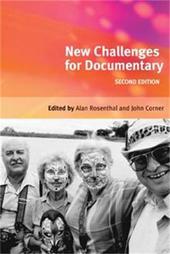
|
New Challenges for Documentary
Paperback / softback
Main Details
| Title |
New Challenges for Documentary
|
| Authors and Contributors |
Edited by Alan Rosenthal
|
|
Edited by John Corner
|
|
Index by Martin Hargreaves
|
| Physical Properties |
| Format:Paperback / softback | | Pages:520 | | Dimensions(mm): Height 234,Width 156 |
|
| ISBN/Barcode |
9780719068997
|
| Classifications | Dewey:070.18 |
|---|
| Audience | | General | | Professional & Vocational | |
|---|
| Edition |
2nd edition
|
| Illustrations |
Illustrations, black & white
|
|
Publishing Details |
| Publisher |
Manchester University Press
|
| Imprint |
Manchester University Press
|
| Publication Date |
10 February 2005 |
| Publication Country |
United Kingdom
|
Description
The first edition of New challenges for documentary provided a major stimulus for teaching about documentary film and television and fresh encouragement for critical thinking about practice. This second edition brings together many new contributions both from academics and filmmakers, reflecting shifts both in documentary production itself, and in ways of discussing it. Once again, the emphasis has been on clear and provocative writing, sympathetic to the practical challenges of documentary film-making but making connections with a range of work in media and communications analysis. With its wide range of contributors and the international scope of its agenda, New challenges for documentary will be essential reading for general filmmakers and documentary students both of academic and practical inclinations. -- .
Author Biography
Alan Rosenthal is Professor of Communications at the Hebrew University of Jerusalem and a documentary film-maker. John Corner is Professor in the School of Politics and Communication Studies at the University of Liverpool -- .
Reviews"Was television "good" for documentary? Hard to believe this question was once posed, since television has so clearly become the dominant institution controlling what counts as "documentary". This shift is well reflected in Alan Rosenthal and John Corner's thoughtful and remarkably comprehensive anthology, which is a substantially revised version of Rosenthal's original 1987 collection. In come welcome discussions not only of "docudrama" and "dramadoc" - subtly different genres - and timely reflections on the spread of "docusoap" as the documentary impulse finds new ways of staying on primetime television." --Ian Christie, Professor of film and media history, Birkbeck, University of London "Was television 0;good1; for documentary? Hard to believe this question was once posed, since television has so clearly become the dominant institution controlling what counts as 0;documentary1;. This shift is well reflected in Alan Rosenthal and John Corner7;s thoughtful and remarkably comprehensive anthology, which is a substantially revised version of Rosenthal7;s original 1987 collection. In come welcome discussions not only of 0;docudrama1; and 0;dramadoc1; - subtly different genres - and timely reflections on the spread of 0;docusoap1; as the documentary impulse finds new ways of staying on primetime television." --Ian Christie, Professor of film and media history, Birkbeck, University of London "Was television "good" for documentary? Hard to believe this question was once posed, since television has so clearly become the dominant institution controlling what counts as "documentary." This shift is well reflected in Alan Rosenthal and John Corner's thoughtful and remarkably comprehensive anthology, which is a substantially revised version of Rosenthal's original 1987 collection. In come welcome discussions not only of "docudrama" and "dramadoc" - subtly different genres - and timely reflections on the spread of "docusoap" as the documentary impulse finds new ways of staying on primetime television." --Ian Christie, Professor of film and media history, Birkbeck, University of London
|